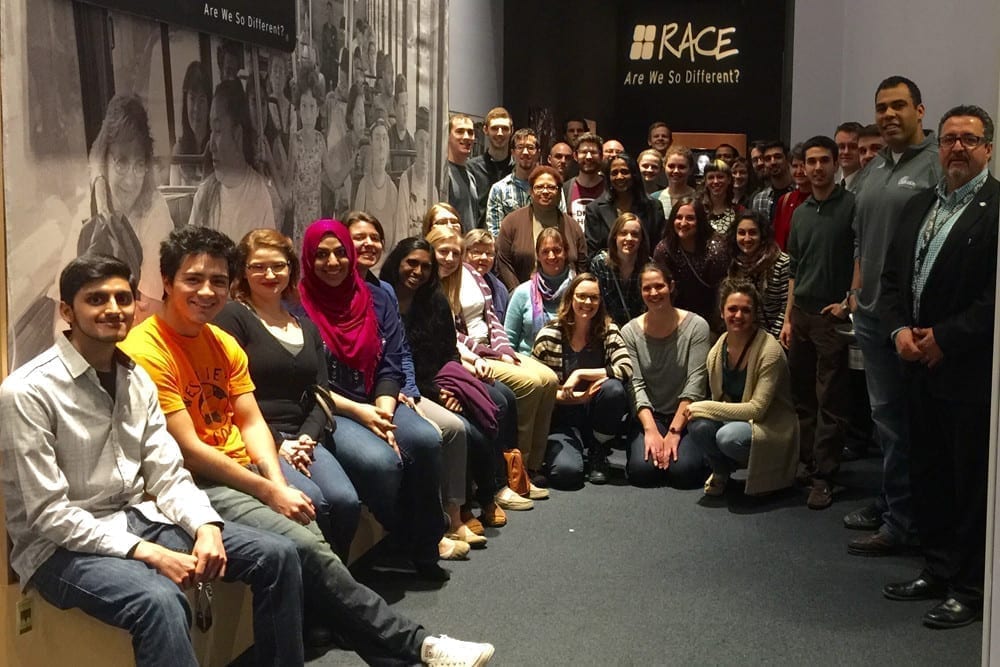By Rich Salas, Ph.D., and Luke Botting, D.O.’18
On Thursday, February 18, a group of approximately 50 DMU students, faculty and staff, along with our president, Dr. Angela Franklin, attended the RACE: Are We So Different exhibit at the Science Center of Iowa. In a nutshell, the exhibit included a rich collection of video, photography, printed word and interactive technology resources. We found three major themes in our exploration of the RACE exhibit:
- The science of human variation and what current science research tells us about human variation;
- The history of race, how race is a social construct and the use of race to determine power and economic interests;
- And finally, how race plays out culturally, socially, politically, educationally and in almost every other facet of our lives.
The first part of the program provided everyone the opportunity to view the exhibit and visit with each other casually. The second part was more direct and intentional in that we identified a list of debriefing questions to guide small group discussions after experiencing the exhibit. We then proceeded as a group to view the vast amount of content contained within the exhibit. An obliging group of students and faculty volunteered to serve as small group discussion leaders. Once we broke down into small groups of six to eight people per table, the discussion took off.
What happened in the next hour was amazing! We began exploring matters of race through open and respectful dialogue as opposed to what we are seeing take place across the country — debate, or worse yet, hate-filled rhetoric, blaming and shaming.
It is obvious that talking about race or being afraid to talk about race either too much or too little does not appear to get us very far. One of the strategies we believe to be productive at Des Moines University is changing the paradigm from debate to dialogue. In other words, listening and seeking to understand another person’s views and experiences and respectfully meeting each other where we are at can be challenging and difficult. However, it is important to be engaged in respectful and inclusive conversation — even if we don’t agree — than take the easy way out and not have these discussions at all.
As future physicians and health care providers, it is important to fully understand the notions of “Do No Harm” and treating all patients with respect, dignity and compassion. In order to effectively do no harm to our patients we must begin with having an understanding of our own personal biases. In fact, in medicine, we create, interpret and act on the “race” data. This is precisely why the Diversity Health Series (DHS) has been well attended and beneficial for rounding out the DMU learning environment. We strive to create a safe environment for self-reflection, respectful discussion and personal growth among learning colleagues through the series.
In order to push the conversation from DHS to a deeper level and address structural issues within the medical system and greater society, the Seeking Justice Series began this year. Administration and faculty are working together to explore meaningful ways to embed the DHS into the DMU curricula to ensure that all future health care providers educated at the University have exposure to these themes and topics. As learned through the Race exhibit and small group discussion, race is a complex variable with many interpretations. But we cannot dismiss the important variable of race because it operates through multiple pathways to affect personal biases, decision making, judgment, communication, health outcomes and ultimately interactions with other human beings.
In our ongoing learning process, exploration of our own personal biases and understanding of race as a social construct, we encourage and invite you to engage in dialogue rather than debate. We are fortunate that DMU has many opportunities for students, faculty and staff to come together and engage in dialogue. The important and ongoing engagement in respectful dialogue will help us recognize and come to learn that we are much more similar than we are different.


